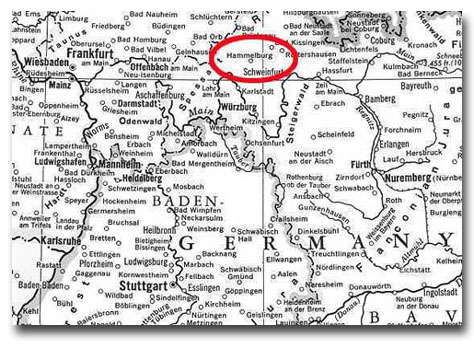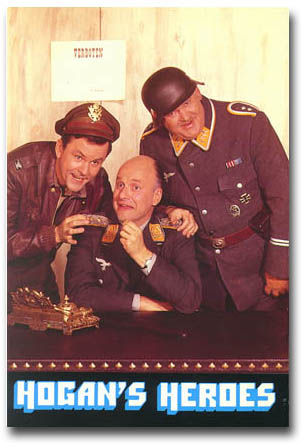|


• There was a ball-bearing plant located 10 miles southwest of
Hammelburg.
(episode #131, "Is There a Traitor in the House?" 1969)
• Mount Hoffenstein Pass is located "just outside Hammelburg".
This fictitious mountain is very large. A sneeze from Colonel Klink caused an
avalanche. (episode #167, "Look at the Pretty Snowflakes"
1971)
• The Hofbräu, Hammelburg's local tavern, was located very close to Mount
Hoffenstein. (episode #167, "Look at the Pretty
Snowflakes" 1971)
• The Hofbräu was closed on Mondays. (episode #167, "Look at
the Pretty Snowflakes" 1971)
• There was dancing every night at the
Hofbräu. One of the featured bands
to perform there was 'Bertha Baumgarten and her All-Girl Orchestra'. Among the
instruments that Bertha Baumgarten and her All-Girl Orchestra played were: trumpet, drums, bass and piano. (episode #167, "Look at the Pretty
Snowflakes" 1971)
• Flensheim Road was located "approximately 3 miles SE of
Hammelburg". (episode #167, "Look at the Pretty Snowflakes"
1971)
• Colonel Klink stated in episode #16, "Anchors Aweigh, Men of Stalag
13" (1965) that Stalag 13 was located 60 miles from the North Sea.
• It was stated in episode #27, "The Safecracker Suite"
(1965) that the nearest big city to Hammelburg was Dusseldorf. This was also stated
in another episode.
• In the town of Hammelburg was a bank called The Brinksmeyer Bank. It was
owned by Heir Brinksmeyer. The assets at the bank were 12 million marks. All
secretaries and tellers were armed. There was a police station across the street.
The guard in the balcony was armed with a machine gun. The Brinksmeyer Bank gave out free calendars at Christmas, featuring
a different picture of the Führer. (episode #50, "The Great Brinksmeyer
Robbery" 1967)
• There was an auto factory located 1 mile from
Hammelburg. It was
transformed into a war plant which produced cannons. The factory was run by Hans Speer.
• In episode #80, "Is There a Doctor in the House?" (1968), the
Hofbräu was called Gretchen Adler's Hofbräu. In episode #13, "Hogan's
Hofbräu" (1965), the Hofbräu was called Hilda's Hofbräu.
• There was a zoo located in Hammelburg called The Hammelburg Zoo. Located
next to the zoo was a ball bearing plant. (episode #91, "Monkey Business"
1968)
• The town of Flensheim was in a 12 mile radius of
Hammelburg. (episode
#132, "At Last–Schultz Knows Something" 1969)
• The Burgermeister of Hammelburg was a 72 year old man with eyesight in one eye
only. (episode #106, "Man in a Box" 1968)
• Other businesses located in Hammelburg were: The Ratskeller and The
Hauser Hof.
• The town of Schmeckhausen
was located about 15 miles from Stalag 13. According
to Fraulein Helga, "There's nothing in Schmeckhausen". (episode
#17, "Happy Birthday Adolf" 1965)
Below is a map of the southwestern section of Germany. You
will note that the town of Hammelburg is circled in red.
(Stalag 13 was located 'near Hammelburg'...but not this one!)

The following
was provided by a Hofbräu visitor...
• Stalag
XIIIB was located 3 miles south of Hammelburg and 20 miles
west of the Schweinfurt ball bearing factory. There were
two compounds: one for 3000 Yugoslavian soldiers, the
other for British and US officers. Most of the Americans
held in the camp surrendered during the Battle of the
Bulge. Among the prisoners was Gen. George patton's
son-in-law. The camp was a hole that received few Red
Cross parcels and little food. Prisoners were reduced to
eating cats. Morale was poor.
John Toland, The Last 100 Days, Random House,1965, p.
288-302
top

• "G-" is the second to the lowest grade a
P.O.W. camp can receive from
the Inspector General. (episode #60, "Colonel
Klink's Secret Weapon" 1967)
• "EE++" is the best grade the Inspector General can give a
P.O.W. camp.
(episode #60, "Colonel Klink's Secret
Weapon" 1967)
• According to regulation, during roll-call, from the sound of the whistle to
complete formation, it should take 48 seconds. (episode
#60, "Colonel Klink's Secret Weapon" 1967)
• The bunks in the barracks must be 27 inches apart.
(episode #60, "Colonel Klink's Secret Weapon"
1967)
• According to Article 15, Paragraph 6, sergeants are not allowed to joke with
prisoners of war. (episode #60, "Colonel
Klink's Secret Weapon" 1967)
• There are 20 barracks at Stalag 13. There are tunnels connecting to all
except for barracks 4. (episode #76, "Everybody Loves a Snowman"
1967)
• It was stated that Hogan has a branch tunnel leading to barracks 9.
• Hogan's heroes were held in barracks 2 at Stalag 13. (episode #97, "To
the Gestapo with Love" 1968)
• Lights are to be shut out in the barracks by 9:00 PM. (episode #108, "Who
Stole My Copy Of Mein Kampf?" 1969)
• In episode #114, "The Purchasing Plan" (1969), the
Heroes had to store ammunition in their underground tunnel before delivering it to different locations. Newkirk climbs
down into the tunnel with a cigarette in his mouth. Colonel Hogan grabs the
cigarette from Newkirk's mouth, throws it to the ground and angrily says "the next
one to light a cigarette down here gets a court martial." If the conditions in
the tunnel are so volatile with the ammunition, why do they have several torches blazing
on the wall???
• The 'heroes' are able to work on vehicles in the motorpool because
General Burkhalter has transferred the entire maintenance crew of Stalag 13 to bomber
service. (episode #143, "Crittendon's Commandos" 1970)
• During the early years of Hogan's Heroes, the heroes' radio code name
was 'Goldilocks', the submarine they always called was 'Mama Bear', and England was 'Papa
Bear'. Later on, Hogan became 'Papa Bear' and their underground contact in London
was 'Goldilocks'.
• A common gag in Hogan's Heroes was Colonel Klink (or anyone else) yelling FIRE!
and then being drenched with water.
• There were a total of 14 men in Hogan's barracks.
• Stalag 13 did not have plumber. Corporal Schneider, a guard at the
stalag, served as plumber until his transfer to the Russian Front. (episode #70, "Nights
in Shining Armor" 1967)
• Listening post number 3 was located in the safe of Colonel Klink's
office. (episode #14, "Oil for the Lamps of Hogan"
1965)
• LeBeau grew mushrooms under the recreation hall. (episode #14, "Oil
for the Lamps of Hogan" 1965)
• There was a picture of Colonel Klink on the will of the de-lousing station
at Stalag 13. (episode #14, "Oil for the Lamps of Hogan"
1965)
Here are the names of other personnel that were stationed at
Stalag 13. They were only mentioned by name and never shown.
- Corporal Waiver - Communications (episode #154, "It's
Dynamite" 1970)
- Sergeant Schmidt - His uncle was an officer in the
Gestapo. (episode #154, "It's Dynamite" 1970)
- Wolfgang, Heidi, Hans and Gerta - Guard dogs.
(episode #87, "LeBeau and the Little Old Lady" 1968)
- Corporal Mueller (episode #154, "It's
Dynamite" 1970)
- Sgt. Engle
- Sgt. Richter also known as "Old Ironside" - Arsenal
guard.
- Corporal Schneider - Served as Stalag 13's plumber. He
was set to the Russian Front. (episode #70, "Nights in Shining Armor"
1967) Corporal Schneider was also married.
|
top

• At Stalag 9, there is a guard by the name of
Kandinski. His
nickname was "Killer". (episode #136, "The Softer They Fall" 1970)
• The Kommandant of Stalag 9 was Colonel
Schmeckler. (episode
#15, "Reservations Are Required" 1965)
• Major Mileing was Kommandant of Stalag 8. (episode #60,
"Colonel Klink's Secret Weapon" 1967)
• Colonel Feldkamp was the Kommandant of Stalag 5. He was
transferred to the Russian Front because he received two (2) G- ratings from the Inspector
General. (episode #60, "Colonel Klink's Secret Weapon"
1967)
• "Berlin Betty" was broadcast every night to England on radio just
after the cricket scores. (episode #131, "Is There a Traitor in the
House?" 1969)
• The scene of Larry Hovis (Sgt. Carter) mixing chemicals during the opening
credits of Hogan's Heroes comes from episode #7, "German Bridge is
Falling Down" (1965)
• Corporal LeBeau wore a blue sweater and
cap in the first 2 episodes instead of his normal red ones.
• Episode #17, "Happy Birthday
Adolf" (1965) took place on April 20, and a few days before.
(April 20 was Hitler's actual birthday)
• During the closing credits of the first 12 episodes, Werner
Klemperer and John Banner had their names on the screen
together. Starting with episode #13, "Hogan's
Hofbrau" (1965), each of their names appeared by
itself on a separate screen.
The following information was provided a
Hofbräu
visitor...
Major
Hochstetter's uniform was not appropriate for the period. The SS of
which the Gestapo was a part of had abandoned the black uniform and switched
to field gray at the onset of the war. This was probably an economy measure
as well as practical one as the black uniform was a bit more visible in
hostile fire situations as opposed to field gray. The Germans were
plagued with problems with producing clothing for their troops throughout
the war and in some cases had to resort to uniform supplies produced by
their allies such as the Italians or Rumanians. After 1939, the only
instances where the pre-war black SS uniform might have been seen was on
"honorary" members of the SS who were given SS rank mostly for
their political and financial support of the Nazi party.
Hochstetter's
auto number plate is entirely inappropriate as it is prefixed with "WH"
which means "Wehrmacht Heeres" and as such would be apply to
vehicles assigned to the army. Vehicles assigned to the SS were prefixed
"SS," (in runic form) but then again the oft-seen "camp"
truck that Hogan often drove was a right-hand drive Morris built truck
supplied to the British during the war.
The website http://www.geocities.com/Hollywood/Academy/4760/
posted the lyrics to the Hogan's Heroes theme
song. For other television show theme song
information, check out the site.
Hogan's
Heroes March
(by Jerry Fielding)
Heroes, heroes, husky men of war,
Sons of all the heroes, of the war before.
We're all heroes up to our ear o's
You ask questions
We make suggestions
That's what we're heroes for.
All good heroes love a good, big fight
Open up the bomb bays and brighten up the night.
We applaud the people who laud us,
You pull the roses,
We punch the noses,
That's what we're heroes for.
What's a hero do?
Well, we're not gonna tell ya
Cause we wish we knew.
That's why we heroes are so few.
We've got a slogan
From Colonel Hogan
And Colonel Hogan's a hero too.
Never flinch, boys, never be afraid,
Heroes are not born, boys, heroes are made.
Ask not why, boys, never say die, boys,
Answer the call, remember we'll all be heroes forever more.
To hear a 30 second sample of the
Hogan's Heroes March, sung by Robert Clary, Larry Hovis,
Richard Dawson and Ivan Dixon, click here.
You will need
the latest copy of Real Player to enjoy this. Download
it here...
• Hogan's
Heroes is featured in the latest Federal Express commercial.

A Hogan's Heroes postcard
top
|